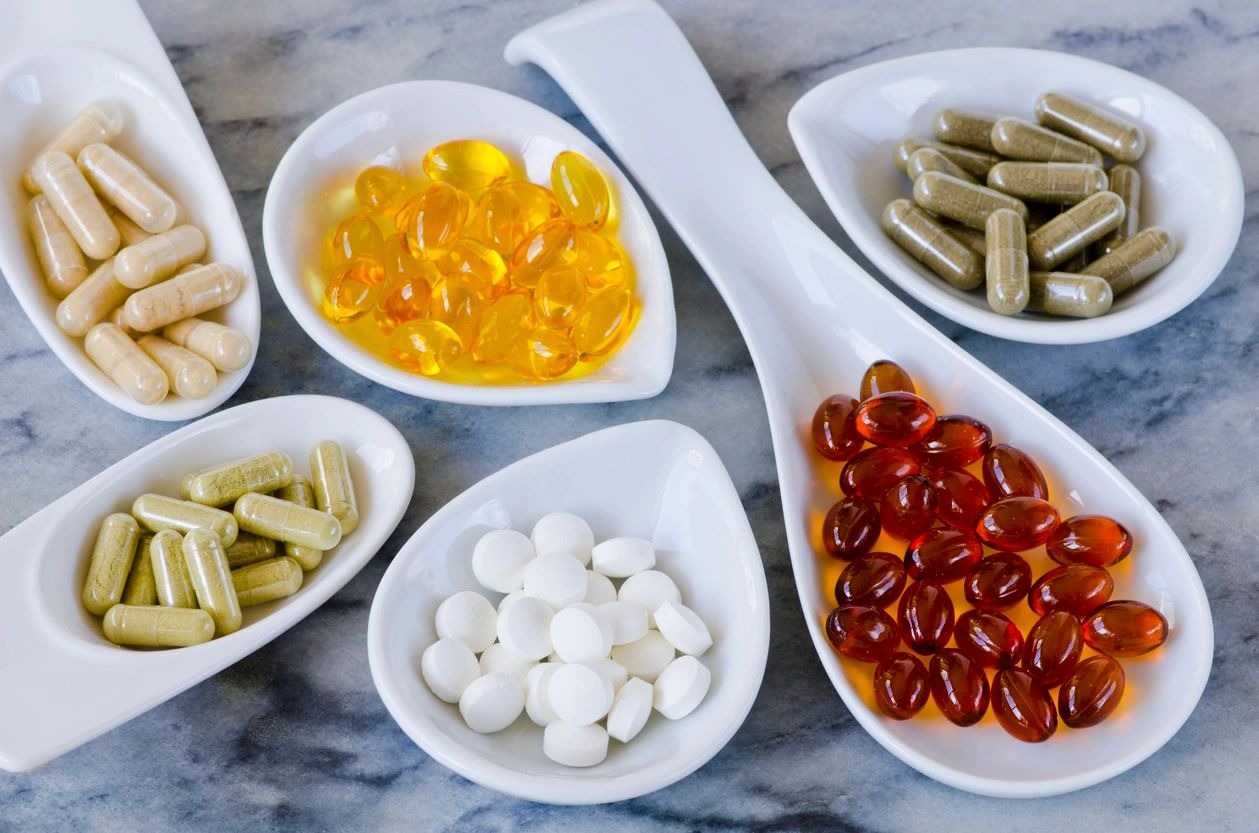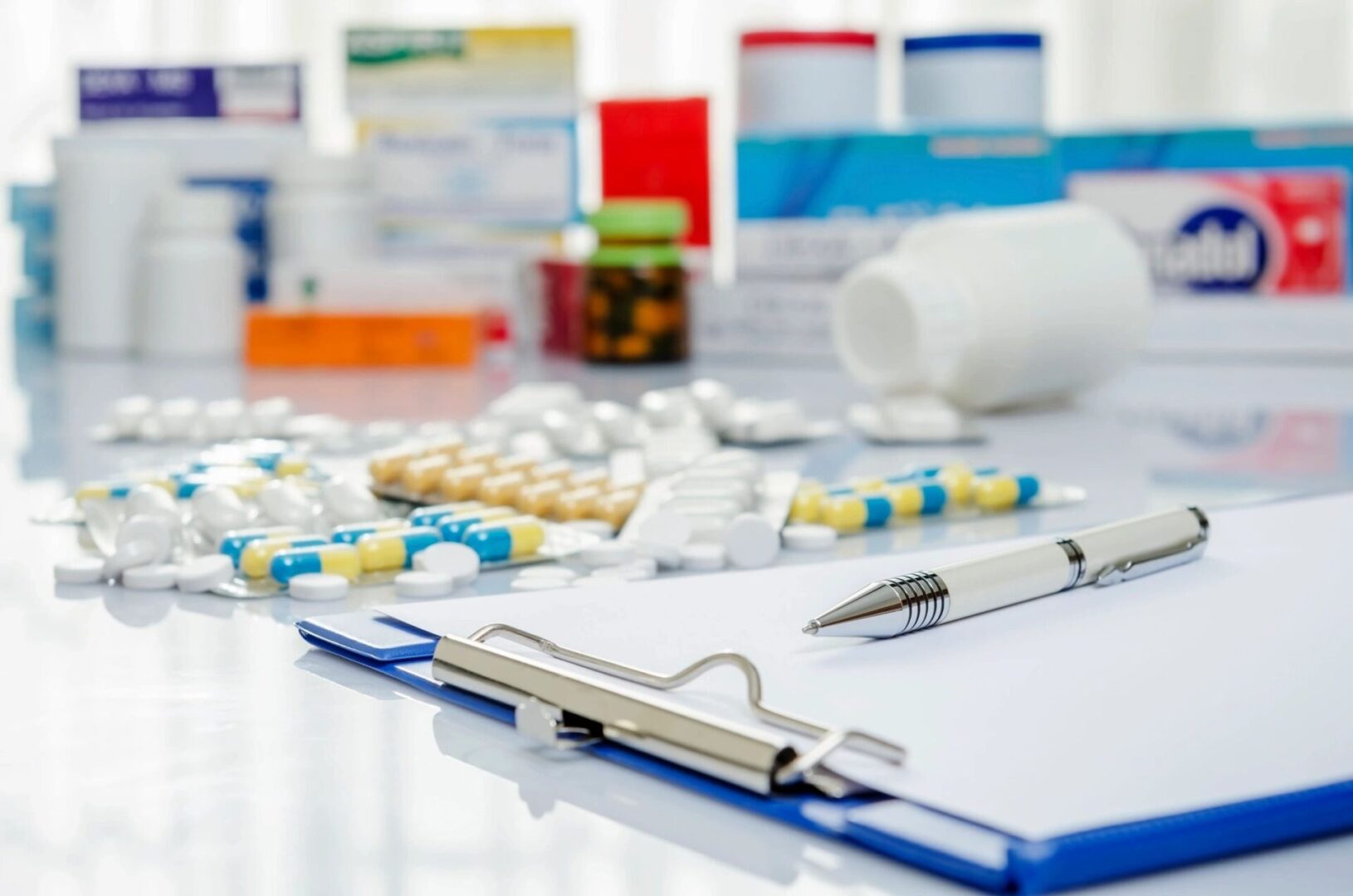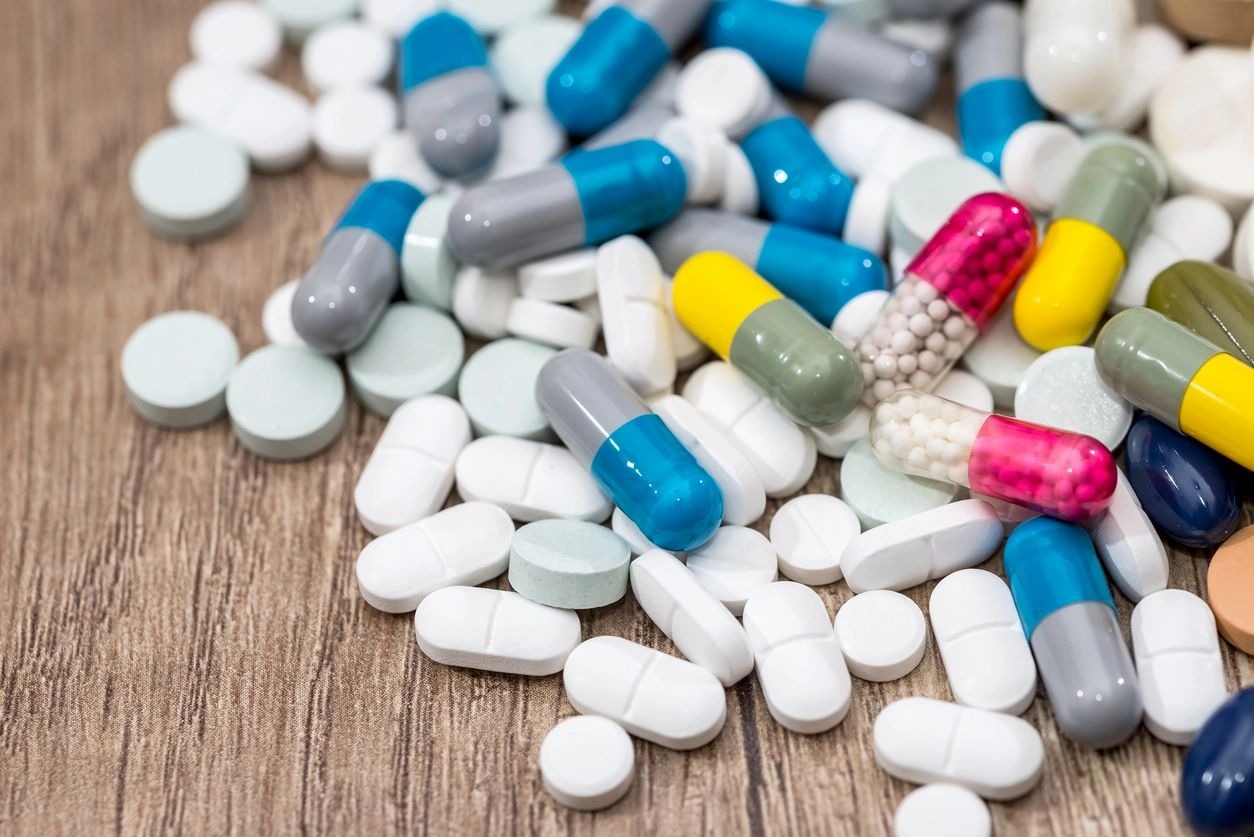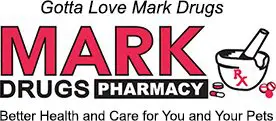
Mark Drugs Pharmacy Bioidentical Hormones
Bio-identical Hormone Therapy (BHRT) is the process of restoring and maintaining hormone balance with hormones that are biologically identical to hormones produced by the human body. These may include estradiol, estriol, progesterone, testosterone, DHEA, hydrocortisone, and possibly the thyroid hormones T3 and T4. Learn more about our bioidentical hormones compounding pharmacy.
Bio-identical hormones have been available and used in hormone treatments for decades. In fact, several of these have been used as parts of conventional prescription medications. Compounding these products to match each person's unique needs and body chemistry, instead of the "one size fits all" approach used with off-the-shelf hormones, can enhance the quality of life of a person by allowing them to feel truly balanced.
Bio-identical Hormone therapy requires appropriate testing, examination, and discussion of symptoms with a healthcare practitioner. We can help you locate a practitioner who has experience with Bio-identical Hormone Therapies that is right for you.
Many conditions may be influenced, at least in part, by hormone imbalance.
Mark Drugs Hormones for Women
Mark Drugs Hormone Information
At Mark Drugs Pharmacy, we compound hormones such as estradiol, estriol, progesterone, and testosterone to help manage a variety of PMS, pre-menopausal and menopausal symptoms. We work with your physician to determine the dosage, frequency, and combination of human-identical hormones your body needs, as well as the proper dosage form to ensure you are receiving the therapy that you and your physician are expecting.
If you are presently using or considering the use of Hormone Replacement Therapy (HRT) and feel that individualized therapy may be more effective than a one-size-fits-all approach, please contact us for more information or call (800) 776-4378.
Bio-Identical Hormone Therapies
Bio-identical Hormone Therapy (BHRT) is the process of restoring and maintaining hormone balance with hormones that are biologically identical to hormones produced by the human body. These may include estradiol, estriol, progesterone, testosterone, DHEA, hydrocortisone, and possibly the thyroid hormones T3 and T4.
Bio-identical hormones have been available and used in hormone treatments for decades. In fact, several of these have been used as parts of conventional prescription medications. Compounding these products to match each person's unique needs and body chemistry, instead of the "one size fits all" approach used with off-the-shelf hormones, can enhance the quality of life of a person by allowing them to feel truly balanced.
Bio-identical Hormone therapy requires appropriate testing, examination, and discussion of symptoms with a healthcare practitioner. We can help you locate a practitioner who has experience with Bio-identical Hormone Therapies that is right for you.
Many conditions may be influenced, at least in part, by hormone imbalance.
Some of these conditions are listed here:
Menopause and Pre-menopause
Menopause is a gradual, natural life transition from the reproductive years to the post-reproductive years. Some women pass through this stage with few symptoms, whereas others may be debilitated by them. Symptoms may begin during pre-menopause, the time prior to or around menopause, which is officially diagnosed only after the final menstrual period. A physician may define menopause as a woman not having had a menstrual period in at least one year or having an FSH blood level greater than 50.
The most common symptoms include:
Hot flashes
Night sweats
Insomnia or difficulty staying asleep
Loss of libido
Vaginal infections and dryness
Urinary Stress Incontinence
Dry skin
Mental fogginess
Headaches
Mood changes
As women age, the ovaries may gradually decrease their production of estrogens and progesterone. This may result in the menstrual cycles becoming more irregular. Eventually, ovulation and menstruation will cease, and estrogen and progesterone production will decline dramatically. This process may span anywhere from 2 to 10 years.
During this transition, treatment can vary greatly, depending on the severity and duration of symptoms. Treatment options will typically include herbal and non-herbal remedy combinations, changes in diet, exercise, meditation, yoga, and hormone therapy (Bio-identical or conventional hormone supplements).
Obviously, there are other potential causes of menopause. These include one or both ovaries being impaired or removed (oophorectomy) or as a result of chemotherapy or radiation to the pelvic area.

Premenstrual Syndrome (PMS)
The American College of Obstetricians and Gynecologists estimates that at least 85 percent of menstruating women have at least 1 PMS symptom as part of their monthly cycle. True PMS is characterized by symptoms that usually occur during the 7 to 10 days before menses, the most common being:
Water retention
Breast tenderness
Irritability
Emotional instability
Headaches
There are many conditions that may mimic PMS. The actual cause(s) of PMS is/are controversial. Theories include poor nutrition, low levels of progesterone and/or an imbalance with estrogen hormones, and thyroid disease. A complete medical history and physical examination to rule out other conditions, such as endometriosis or ovarian cysts, is typically done by a health professional. A diary that relates symptoms with the menstrual cycle may be extremely useful to differentiate PMS from other medical conditions.
Treating PMS may require a combination of solutions, including Bio-identical Hormone Therapy, dietary changes, and other lifestyle modifications.
Postpartum Depression (PPD)
Following the birth of a child, postpartum depression (PPD) may occur. PPD is characterized by feelings of an emotional roller coaster. Being constantly "teary" or more extreme feelings of being unable to cope, spontaneous rage, or a mother's fear that she may hurt herself or her baby. These feelings may occur at any time within the first year, but according to the National Institute of Health, they will typically first appear within the first 4 weeks following childbirth. PPD exhibits different levels of severity, ranging from the "baby blues" to psychosis. The "baby blues" is characterized as a short period of anxiety and weepiness due to the shift in hormones immediately after birth. With the most severe cases of PPD psychosis, a mother may experience extreme rage, severe depression, and/or delusions.
Treatment for these women should include a complete assessment of the individual's needs. This could include specific lab evaluations, psychiatric assessment, education, therapy, support, and medications, including Bio-identical hormones, as needed.
Endometriosis
Endometriosis is a condition where the endometrial tissue normally found inside the uterus is found outside the uterus. These cells then implant themselves onto other organs, predominantly but not limited to the pelvic area, where they grow and cause pain, infertility, and other problems. There are a variety of treatments for endometriosis. These may depend on the severity of the condition and symptoms, where the endometriosis is located, and the age of the patient. Treatment may include surgery, medications, and bio-identical hormones, as needed.
Female Sexual Dysfunction (FSD)
Many women experience a loss of interest or pleasure in sexual activity at some point in their lives. If these problems are recurrent or persist to the point that they become distressful, this is referred to as Female Sexual Dysfunction (FSD).
Sexual dysfunction may be a result of many different conditions, and most may be readily treated. A physician or other clinical specialist can perform a thorough pelvic exam to reveal if there are physical changes that may be affecting sexual pleasure. Hormonal shifts, such as those occurring after pregnancy and during menopause, may also lead to sexual dysfunction. While the role of estrogens is well known, imbalances in thyroid hormones, testosterone, and progesterone can also affect sexual function.
Other causes may include health conditions such as sleep apnea, diabetes, and depression. Many common medications can diminish sexual response, including birth control pills, antidepressants, and blood pressure drugs.
Symptoms may include:
Little or no desire for sex (diminished libido)
Failure to become or remain aroused
Inability to achieve orgasm despite significant arousal
Painful sex (dyspareunia)
Treatments will typically try to target the known or suspected cause of sexual dysfunction. These include bio-identical hormone therapy, medication changes, lifestyle modifications, herbal & nutritional preparations, sexual therapy, relaxation techniques, and pelvic exercises.

Infertility
Infertility is the inability to conceive a child and can be due to many different factors. One possible cause of infertility is a luteal phase defect (LPD). This is due to inadequate progesterone production during the luteal phase of the cycle. Progesterone stabilizes the tissues of the uterine wall or lining and prepares it for the implantation of a fertilized egg. Progesterone supports the growth of the fetus throughout a full-term pregnancy. Research indicates that "bio-identical" progesterone can raise the body's progesterone level sufficiently to help a woman to conceive and carry a full-term pregnancy. When progesterone is low, the uterine lining may become destabilized sufficiently that there is inadequate support for the fertilized egg, and this can result in a miscarriage.
Testosterone Deficiency
Although a woman's "normal" amount of testosterone is only a fraction of that of a man's, it is still vital for both sexes. Besides the obvious roles in sexuality, testosterone is essential for maintaining strong muscles and bones, mental acuity, cognitive function, and the ability to enjoy life (joie de vive), and it is important to cardiovascular health.
As a person ages, testosterone levels tend to diminish. This can be particularly problematic for women because there is far less present, to begin with. Common signs of a potential testosterone deficiency include:
Decreased libido
Vaginal dryness
Lack of energy, vitality, and motivation
Loss of muscle tone, coordination, and balance
Leaky bladder
Weight gain
Depression or anxiety
Although women will typically begin to experience these symptoms after menopause, as their hormone levels decline, pre-menopausal women can also be deficient in testosterone. This may be a result of childbirth, endometriosis, or substance abuse. Some medications, such as birth control pills, chemotherapy, and antidepressants, can interfere with the body's ability to make use of the testosterone that is available.
Careful testing and monitoring are often recommended for testosterone replacement therapy because it typically involves other hormones as well. Bio-identical testosterone supplements are available as custom-compounded therapies in capsules, lozenges, injections, creams, gels, and other forms.
Osteoporosis
Osteoporosis is a progressive disease of the skeletal system where bone density decreases and bone structure deteriorates. Eventually, bones become brittle and porous and can fracture from even mild stress. There are no tests to measure bone quality, so osteoporosis is diagnosed by measuring bone mineral density (BMD), usually with x-rays of the hip or spine.
Although some illnesses, diseases, and medications (especially corticosteroids) can cause bone loss, most people develop osteoporosis as a result of the aging process. Bone loss in women accelerates with menopause due to decreased production of estrogens, progesterone, and testosterone, among others that contribute to bone health.
In the early stages of osteoporosis, there are no symptoms. As bones become weaker, symptoms may begin to appear. These may include:
Gradual loss of height, accompanied by a stooped posture (Dowager's Hump)
Arthritis-like pain in the bones and joints
Fractures, especially of the wrists, hips, and spine
Back pain, which can be severe if it results from fractured or collapsed vertebrae
Treatments that can slow down or even reverse bone loss include weight-bearing exercise, supplements, bio-identical hormone therapy, and medications that inhibit bone breakdown.
Chronic Fatigue Syndrome (CFS)
Chronic Fatigue Syndrome is a condition characterized by persistent, debilitating fatigue that doesn't improve with rest and may worsen with physical or mental exertion. Women are two to four times more likely than men to develop this condition, which can persist for years.
Symptoms typically start after a stressful event, infection, or viral illness. However, the syndrome can begin gradually without any obvious trigger.
Diagnosis may be made only after all other causes of severe fatigue are ruled out. Additionally, four or more of the following symptoms must persist or recur for at least six consecutive months.
Sore throat
Painful, mildly enlarged lymph nodes in the neck or armpits
Unexplained muscle soreness
Pain that moves from one joint to another without any swelling or redness
Headache of a new type, pattern, or severity
Memory loss or trouble with concentration
Sleep disturbances
Extreme exhaustion lasting 24 hours after normal exercise
Though there is no specific cure for chronic fatigue syndrome, treatments to relieve symptoms include exercise, massage, diet and lifestyle changes, counseling to address depression, antidepressants, pain relievers, herbals, and nutritional and bio-identical hormone therapies.
Fibromyalgia (FMS)
Fibromyalgia is a chronic disorder characterized by intermittent "head-to-toe" pain, tenderness, and fatigue. Fibromyalgia is more common in women, and the risk of developing it increases with age.
Symptoms vary in number and intensity. They often co-exist with other illnesses, which makes diagnosis difficult. Symptoms often start after physical or emotional trauma and may include:
Pain in muscles, tendons, and ligaments throughout the body, but patients usually experience recurrent episodes of intense pain in the same "tender points."
Muscle stiffness, usually worse upon awakening.
Impaired memory and concentration.
Fatigue and sleep disturbances.
Gastrointestinal problems.
Although its cause is unknown, FMS appears to run in families. It is often associated with other health issues, such as autoimmune disorders, chronic infections, and hormone imbalances.
Treatment may include nutritional supplements, herbal preparations, massage, exercise, dietary changes, pain relievers, antidepressants, anti-seizure medications, and bio-identical hormone therapies.

Mark Drugs Hormones for Men
Welcome to Mark Drugs Men's Health page. Many things affect men's health, including but not limited to environment, genetics, age, stress, lifestyle, nutrition, exercise, and relationships. At Mark Drugs, we are committed to helping you achieve your optimal health goals by addressing the health issues you are most concerned with, including cardiac health, prostate health, erectile dysfunction, hormone replacement therapy for men, weight loss, nutritional needs, and much, much more. The professional staff at Mark Drugs can assist you and your practitioner in customizing therapy designed to achieve your specific health and life-enhancing goals.
Whether you need a referral physician to assist you or you want us to work with your present healthcare practitioner, Mark Drugs will work for you. Please look at our Find a Doctor page to find a doctor who is right for you.
Progesterone and BPH Hormone Information
What is Progesterone?
What is BPH, and What are the Symptoms?
Why Would Men Need to Replace Progesterone?
How Do I Use Progesterone Cream?
What Else Can Cause Estrogen to Increase?
For more information on Progesterone Cream or Men's Health:
Progesterone is a hormone that is the precursor of cortisol and testosterone. It also maintains the correct range of Estradiol (E2). When Estradiol levels are not maintained correctly, it may cause prostate growth, leading to Benign Prostate Hypertrophy (BPH).
Benign Prostatic Hypertrophy is quite simply the swelling of the prostate. Most men older than 40 will suffer from some symptoms of BPH at some point. Symptoms include:
Interrupted weak urinary stream
Need to urinate frequently, especially at night
Dysuria-painful urination
As men age, Progesterone levels naturally decrease, allowing Estradiol levels to rise. By supplementing with Progesterone Cream, Estradiol levels are stabilized within normal ranges. Progesterone supplementation does not produce any feminizing characteristics.
Progesterone Cream is rubbed onto the skin topically onto the sides of the abdomen and upper inner thighs. The proper dosage for this condition is 1/8 teaspoon of the Progesterone 2% Cream daily.
All Estrogen levels can be raised by a variety of factors, including Xeno-estrogenic compounds that are added to pesticides, plastics, solvents, adhesives, and meat.
For more information on Progesterone Cream or Men's Health:
Contact your Mark Drugs, Roselle Pharmacist, at (630) 529-3400.
Mark Drugs Hormone Drug Information
At Mark Drugs Pharmacy, we compound hormones such as estradiol, estriol, progesterone, and testosterone to help manage a variety of PMS, pre-menopausal and menopausal symptoms. We work with your physician to determine the dosage, frequency, and combination of human-identical hormones your body needs, as well as the proper dosage form to ensure you are receiving the therapy that you and your physician are expecting.
If you are presently using or considering the use of Hormone Replacement Therapy (HRT) and feel that individualized therapy may be more effective than a one-size-fits-all approach, please contact us for more information or call (800) 776-4378.
